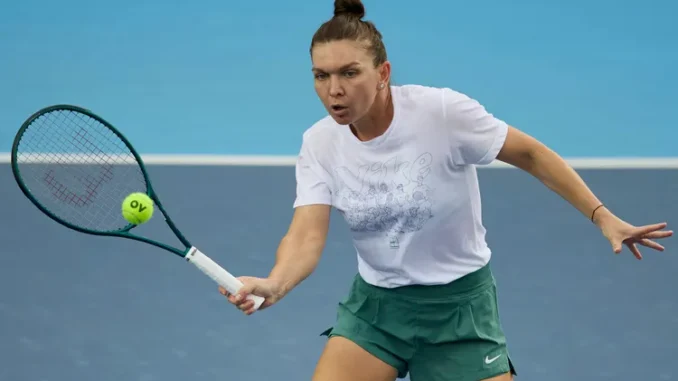
WTA Players’ Council Refuses Simona Halep’s Request to Restore Ranking After Doping Ordeal
Simona Halep’s battle to restore her tennis career following her doping suspension has taken yet another difficult turn. Reports have emerged that the WTA Players’ Council denied Halep’s request for assistance in regaining her ranking after her extended absence from the tour. The decision has sparked heated debates about fairness, the role of governing bodies, and the treatment of players navigating the murky waters of doping allegations.
Halep’s Ongoing Struggles
The Romanian star, a two-time Grand Slam champion and former world No. 1, has been embroiled in controversy since testing positive for the banned substance Roxadustat during the 2022 US Open. The suspension, coupled with additional allegations of irregularities in her biological passport, has kept Halep off the court for over a year. In October 2024, the International Tennis Integrity Agency (ITIA) handed her a four-year ban from professional tennis—a decision Halep has appealed to the Court of Arbitration for Sport (CAS).
Despite her legal efforts, the lengthy process has left Halep in professional limbo. Without a current ranking, she faces significant obstacles to resuming her career should her ban be overturned or reduced. Ranking points are essential for players to gain entry into tournaments, and Halep’s extended absence has effectively erased her standing on the WTA Tour.
The Role of the WTA Players’ Council
Halep turned to the WTA Players’ Council, a representative body within the Women’s Tennis Association, to seek help in regaining her ranking. Such requests are not unprecedented; governing bodies have occasionally provided protected rankings or other accommodations for players sidelined by injury, illness, or extraordinary circumstances. Halep’s case, however, is complicated by the nature of her suspension and the broader implications of doping violations in tennis.
The Players’ Council reportedly refused to intervene, citing the need to uphold the integrity of the sport and avoid setting a precedent that might undermine anti-doping protocols. While the Council’s decision aligns with the strict stance many sports organizations take on doping, it has drawn criticism from Halep’s supporters, who argue that her case is unique and deserving of special consideration.
Halep’s Reaction
In a statement, Halep expressed deep disappointment with the Council’s decision, calling it “a betrayal of the values of fairness and compassion that the WTA claims to uphold.” She emphasized her belief in her innocence and reiterated her commitment to clearing her name through the appeals process. Halep also accused the Council of failing to understand the personal and professional toll her ordeal has taken.
“This decision is not just about me—it’s about the message it sends to players who may face similar challenges in the future,” Halep said. “The Players’ Council had an opportunity to stand for justice and fairness, but instead, they turned their backs on me.”
Divided Opinions Among Players
The Council’s decision has sparked a divide within the tennis community. Some players and commentators have voiced support for Halep, arguing that the extended duration of her case and the complexities involved warrant exceptional measures. Former players like Chris Evert and Marion Bartoli have called for greater empathy, highlighting Halep’s contributions to the sport and her previously unblemished record.
On the other hand, some argue that granting Halep special treatment would undermine the integrity of anti-doping efforts. Critics believe that the Council’s decision reflects a commitment to maintaining a level playing field, regardless of a player’s past achievements or reputation.
“Doping allegations are serious, and any deviation from standard protocols risks sending the wrong message,” one anonymous player commented. “The rules must apply equally to everyone, no matter how big a name they are.”
Comparisons to Other Cases
Halep’s supporters have drawn attention to perceived inconsistencies in how doping cases are handled across sports. For instance, Maria Sharapova, who was banned for 15 months in 2016 after testing positive for Meldonium, returned to competition with the help of wild cards granted by tournament organizers. Halep, however, appears to be facing a tougher road back, with little institutional support.
The WTA’s refusal to assist Halep has also been contrasted with the ATP’s handling of other players’ challenges. In the men’s game, Novak Djokovic has received considerable support from governing bodies during his disputes over vaccination requirements and travel restrictions. Halep’s defenders argue that her case deserves similar advocacy.
Implications for the WTA and Anti-Doping Efforts
The WTA Players’ Council’s stance raises broader questions about the balance between enforcing anti-doping rules and supporting athletes navigating complex situations. Critics argue that the WTA risks alienating players by appearing unsympathetic to individual struggles, while proponents of the decision see it as a necessary step to maintain trust in the sport.
For Halep, the immediate concern is whether she can secure any avenue to re-enter competitive tennis if her appeal succeeds. Without ranking protection or wild card offers, she would likely have to start from scratch, competing in lower-level tournaments to rebuild her position on the tour. Such a path would be a steep climb for a player in her 30s who has already achieved the pinnacle of the sport.
Looking Ahead
As Halep awaits the outcome of her appeal to CAS, the spotlight remains on her fight to clear her name and the challenges she faces in reclaiming her career. Whether the WTA will reconsider its position or provide alternative support remains uncertain. In the meantime, Halep’s case continues to spark debate about fairness, accountability, and the responsibilities of tennis’ governing bodies.
For fans and players alike, the situation serves as a stark reminder of the high stakes and complex realities of professional tennis. As the sport grapples with these issues, Halep’s journey will undoubtedly remain a focal point in the ongoing conversation about doping, justice, and the treatment of athletes in moments of crisis.
Leave a Reply